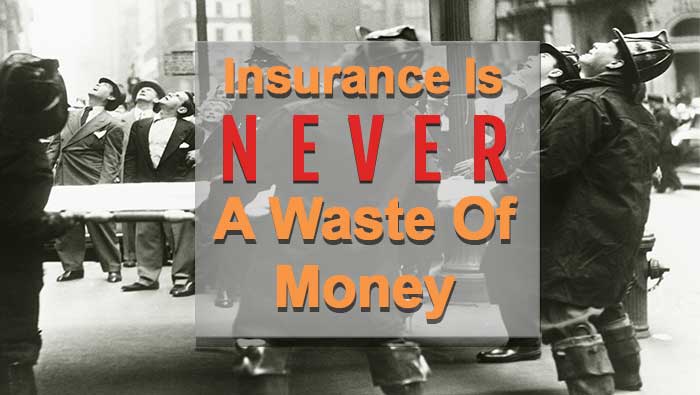
Insurance is never a waste of money
I speak with a lot of financial planners and one recurring theme I’m hearing at the moment is how clients are reacting to premium increases. For many, it’s because they’re getting older – in their 50’s and 60’s and the premiums are getting expensive due to their age.
I remember one time a few years ago having a conversation with a client who was concerned about the cost of his policy. I steered the conversation back to why he needed the cover in the first place, he admitted that they still had considerable debt and a very real reason to keep their cover. But I remember saying something like “Hopefully you never need to claim on your insurance -you won’t die prematurely, suffer a TPD or trauma event and you’ll get to a point where you no longer have a need for the cover. And at that point, you’ll probably feel like it’s a waste of money to have held the cover.”
Instantly after saying it, I realised I’d said the wrong thing. And you may have said the same thing to your clients.
When I said the bit about “you’ll probably feel like it’s a waste of money to have held the cover” I knew that was the wrong thing to say. Because it’s not a waste of money to hold cover that you never use.
This may seem a bit abstract, but the value of insurance isn’t just about when it pays out. That certainly is a big part of it, but if you’ve held life insurance – and TPD and trauma and Income Protection – and you never need to claim on it, that doesn’t mean it was a waste of money. It’s actually done exactly what it needed to do.
I believe a very valuable part of holding the cover is because it’s a safety net. It provides the potential for protection and whether or not we ever need that protection is a secondary thing.
I was thinking about this today when I was driving. I wear my seat belt when I drive. Here in Australia, it’s illegal not to. And the fact that it’s been years since I’ve been in any car accidents doesn’t make me want to wear my seatbelt any less, and it certainly doesn’t mean that I wish I could buy a car that was slightly cheaper because it has no seatbelts!
My seat belt gives me some confidence when I drive my car. I know that if I’m involved in an accident, the seat belt will help to protect me. But I don’t get annoyed when I don’t have an accident and it doesn’t spring into action – because it’s doing what it’s supposed to do all the time.
I never get out of my car thinking “I wish I’d had an accident so I could get some value from that seat belt and front airbag.” No one does that. But it actually provides value all the journey because it’s there just in case.
Think of the trapeze artist at the circus. Imagine if they said “don’t worry about a safety net under my trapeze. They cost a bit of money and I’d prefer to be able to spend that money on other things.” The point of the safety net is to provide some protection and peace of mind in case something goes wrong, but the intention is to never have to use it in a performance.
So let’s circle back to insurance.
When we position it as only being useful if they make a claim, we’re missing the point. It’s like the trapeze artist getting to the end of their career and saying that the safety net was a waste of money. It’s not. It’s actually done exactly what it was supposed to do. It could also have protected them if they fell, but they’re probably thankful they never tried that bit out.
That’s how we need to start speaking about insurance with our clients.
If you never make a claim, it’s still done exactly what it’s supposed to have done – provided protection ‘just in case.’ And it was worth paying those premiums for that reason alone.
And if you’ve never had to claim, fantastic, because that probably means you’re in better health than you would have been had you made a claim.
Insurance – it’s not just about the claims, but about the protection along the way.
What do you think?
How do you position insurance with your clients?
Is it a waste of time if you never make a claim?


0 Comments